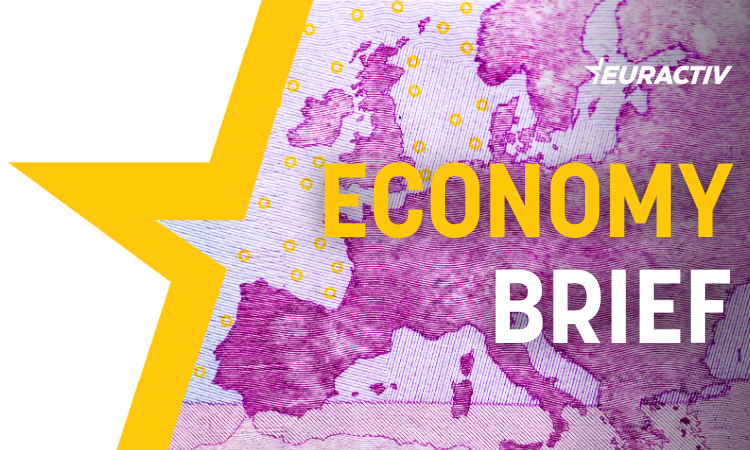
Welcome to Euractiv’s weekly Economy Brief. You can subscribe to the newsletter here.
The EU’s economic policy of the past few years is a story of twisted attempts to adjust its policies to the requirements of the real world within the rigid, ordoliberal framework of the EU Treaties. But as long as this framework remains in place, the EU will keep undermining its security, economic growth, and democracy.
This is the last Economy Brief of the year and the last Economy Brief I will write as Euractiv’s economy editor. For this edition, which comes in a slightly different format, I have tried to order some thoughts on the EU’s economic policy, parts of which you will have encountered in previous Economy Briefs. Thanks for reading, and happy holidays!
Look, the situation is not good.
Let’s start with the existential: In a year and some days from now, Trump could very well be US president again, this time supported by a totally devoted Republican party. He could plausibly withdraw the American security guarantee from Europe a day, a month, a year after that. A day, a month, a year or two after that, Russian troops could technically cross EU borders, and God knows how Europe would react to that.
I start this text about the EU’s economic policy with speculation about US policy because markets are fundamentally political constructs, and if the political pillars holding them up fall away, the market will disintegrate. And for now, the EU is utterly dependent on US security.
Europe has underinvested in security for a long time primarily because it could freeride on US security. But it certainly hasn’t helped that the EU’s budget discipline, state aid rules, and lack of a central fiscal capacity make meaningful increases in military spending politically tricky and a real industrial policy for the defence industry legally difficult.
Ordoliberal Barbie World
Essentially, the EU’s most basic rules are made for ordoliberal Barbie World, where economic actors find themselves in the perfect harmony of market equilibrium, efficiently allocating scarce resources thanks to perfect information, a stable currency, and internalising external effects. Today is like yesterday is like tomorrow, and destiny is determined by the anonymous interplay of market forces that, in their infinite wisdom, will bring about the best of all possible worlds.
There’s no ageing society, no radical technological transformation, no looming ecological catastrophe that requires a fundamental reorganisation of economic life, no Chinese economic coercion, and certainly no Russian invaders.
Oh, wait, these things are actually happening? Well, surely we can surely react to them within the governing principles of Barbie World: balanced public budgets and an independent central bank solely focused on price stability, technological neutrality, and free trade.
Of course, we can’t.
Take the defence industry, for example: With the EU being unable to support Ukraine and thus secure its immediate neighbourhood on its own, it’s the far-away (but certainly not ordoliberal) South Korea that indirectly delivered more artillery shells to Ukraine than all EU member states combined.
Well, you might justifiably say the EU should not only be judged on whether it has led to the emergence of a strong defence industry, even though other aspects of security, namely economic security, have also suffered from excessive ordoliberalism, as Tobias Gehrke shows in this op-ed for Euractiv.
So, let’s move to another existential issue: The environment. The EU – it has to be commended for being the first big player to take this issue seriously – pursued an approach based on the internalisation of external costs through an emissions trading system.
This system is great, in sanitised theory, as it is technology-neutral and lets the market decide on the alternative technology that will emerge as a winner.
Who leads the transition?
The problem is that the market does not want to decide.
Companies need security if they will invest billions into revamping their products and production processes. If there’s a conceivable risk that they might choose the wrong new technology, managers are better off using that money for share buybacks that boost share prices and their salaries.
Thus, waiting for the market takes too long, even if you internalise the external costs and create a complex web of reporting criteria that companies are, understandably, rebelling against.
Many companies want the state to choose a direction so that they can plan and adjust their investments accordingly. Ideally, the state would also spend a lot of money to support emerging technologies, providing some carrots to companies instead of only sticks.
But the EU lacks the central fiscal capacity to provide such carrots and national carrots are either constrained by state aid rules or, if these are temporarily relaxed, by the fiscal rules that require balanced public budgets. The EU’s policy goals have to conform to the ordoliberal Barbie World’s principles, not the other way around.
Naturally, this artificial limitation of the EU’s margin of manoeuvre to regulatory action sets corporate interests squarely against environmental interests, as seen in the recent pushback against the European Green Deal or the due diligence law in the name of European competitiveness.
Impossible rules or impossible goals
Earlier this year, the EU Commission’s Strategic Foresight Report stated that the EU would need around 620 billion euros in additional annual investments to reach its climate goals. This week, EU finance ministers agreed on a fiscal rules reform requiring most governments to curtail their spending. EU-level money is also not available anymore, as the “European Sovereignty Fund” concept seems to have been shelved by the EU Commission.
Add this to the need for more security spending and more industrial policy in other geoeconomically essential technologies, and the task’s impossibility becomes evident.
Either the rules are broken, or the policy goals are not reached. Or both, which is where I put my money.
As I wrote in an earlier Economy Brief, the EU’s climate action is also hampered by the design of its monetary policy, which, neatly along ordoliberal lines, pursues the primary goal of price stability. In the last two years, we have seen how the European Central Bank (ECB) reacted to a supply-driven price shock by raising interest rates, which brought the wind energy industry into serious trouble among others.
As the next supply shocks loom due to geopolitical events (look at energy and shipping costs as a result of the Red Sea attacks this week, for example) or due to environmental disasters, a price-stability-focused ECB will see itself forced to hike interest rate again, clamping down on public and private investment and thus on economic growth.
Danger to Democracy
Of course, most EU legislators and officials do not live in ordoliberal Barbie World anymore. Many see the dangers and necessities of the day quite clearly. And in many regulations, for example, the EU has moved towards a more interventionist approach, look at the ban of the internal combustion engine, for example. Moreover, the new fiscal rules allow for a little more flexibility than they used to. And there is some money for semiconductors!
Nevertheless, the main principles of ordoliberal Europe remain largely unchanged, mostly because they are ingrained in the EU Treaties and those can only be changed by unanimity. This fact seriously undermines the democracy of the European Union, not least because the ordoliberal economic policy principles have distributional consequences.
Even large European popular majorities will not be able to change them as long as a single country would like to stick to it. And a single country cannot decide to try following other economic policy principles while staying in the EU.
The “depoliticisation” of economic policy is undemocratic in itself, but a case can be made that it undermines democracy in general. A Chatham House research paper from last year argues that the impossibility of having fundamental policy debates on economic policy shifts the focus of the debate to other, often more corrosive, cultural questions, favouring the rise of right-wing extremists.
Their rise in recent years, which austerity policies have also helped, has led European politicians to take a harder stance on immigration at a time when an ageing Europe would need many workers, stunting economic growth.
This is an example of what is so infuriating about the ordoliberal guardrails that the EU has set itself as they lead to unambitious, counterproductive solutions. They stunt growth, they slow down innovation and thus the green transition, they set corporate interests against the green transition, they make the EU vulnerable to foreign coercion, and they put workers in a disadvantaged bargaining position, all in the hope that the market forces will lead to the right thing in the end.
But no magical equilibrium will suddenly appear.
My hope for the coming years is that European politicians will achieve to break out of the ordoliberal Barbie World framework that governs the EU without breaking the political project of a united Europe.
In the meantime, cross your fingers for Biden.
[Edited by Alice Taylor]







